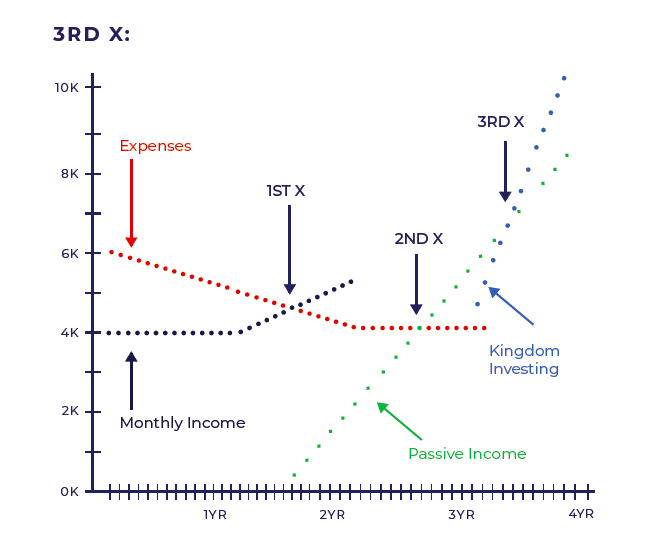This blog was originally published on January 5, 2023, and has since been updated for accuracy and relevance.
We have all been there. You start out with strong financial goals, but over time, your motivation starts to waver. You might find yourself spending a few harmless dollars eating out, purchasing an expensive gym membership, or planning a vacation on credit (you’ll pay it off later, right?) Perhaps you struggle with money motivation because you don’t have a clear goal or you don’t believe that you can prosper. Regardless of the reason, financial discipline is a skill that anyone can cultivate.
This blog contains seven fool-proof tips and tricks to help you stay motivated with your money. But first, what are financial goals, and how do you plan them?
What are financial goals and why do they matter?
Financial goals are objectives you set for spending, saving, or investing money. They are driven by your wants and needs.
Goals matter because they assign a purpose and a vision to your money. Proverbs 29:18 (KJV) says, “Where there is no vision, the people perish.” Without financial goals, the inevitable result is poor stewardship and wasted resources that could be put to use for the next generation and the Kingdom of God.
How do you plan good financial goals?
There is no cookie cutter way to create financial goals. Planning good financial goals starts with understanding your personal motivation and aspirations in life. Make your goals SMART: specific, measurable, achievable, relevant, and time bound. The following eight tips will help you hone your goals and stay disciplined until you achieve them all!

How to Have Financial Discipline
1. Have a Big Enough Dream
We exchange money for what we value. Many people struggle with financial discipline because they don’t clearly understand why saving money is valuable. So, they gravitate toward spending money on immediate, tangible rewards.
Other people understand the value of saving because they see the dollars pile up in their bank accounts. However, they need help seeing the value of investing. The risk seems greater than the reward of ‘controlling’ their money (even when it’s depreciating due to inflation.)
So, to have financial discipline, your dream needs to be more valuable than the satisfaction of an immediate reward and stronger than the fear of potential risk. Many times, a deficit of desire is why people don’t achieve their goals.
What will your life look like when you achieve your financial goals? Get into a posture of prayer and invite the Holy Spirit into your imagination. What dreams does God have for your life, and how does He want to use your resources to achieve them?
Here’s the thing: financial dreams founded on personal comfort won’t be enough to reach your potential. There will come the point on your financial journey where you stagnate because you aren’t willing to take a risk. Rewards will feel too comfortable to sacrifice. Growing to the level God has for you takes courage, love, and divine intervention. Your dream must be bigger than you!
2. Break the Dream Into Actionable Steps
The secret to knowing how to have financial discipline is in your daily practices. Once you have a 30,000-foot view of your dream(s), it’s time to create a system to make them a reality. Your system will depend on your unique goals and where you are in your financial journey.
For example, if you are trying to get to the point where you make more than you spend, you need a system to get out of debt. My Debt Snowball Method can help with that. It shows you how to pay off your debts, starting with the one you can pay off the quickest (not the one with the highest interest rate.)
If you are already out of debt, the next step is to create a budget that puts you on the fast track to financial freedom. You’ll need to create an investment plan so your passive income can exceed your earned income.
I recommend budgeting using the 70/30 rule as a template. Here’s a breakdown of how to use your income:
- 10% for tithe
- 70% for expenses
- 20% for investments
Of course, there are nuances to this system. For example, God might lead you to give more than 10 percent of your income. Or, your expenses might only equate to 55 percent of your income, creating more flexibility to invest. You may want to bolster your emergency fund before you venture into investments. Then there’s the question of what to invest in–you may be saving for the down payment on a rental property or funneling money into your Roth IRA. As you grow your earning potential, passive income, and investing acumen, you can diversify your investments.
If you have already reached financial freedom, you may be wondering about your next steps. How do you protect and continue to grow your assets? How do you dream bigger about the impact your resources can have? At this stage of your investment journey, joining a reputable coaching program is highly beneficial. In The WealthBuilders Coaching Program, we have a business track and a real estate investing track to help people maximize their passive income and exceed growth barriers.
3. Segment Your Spending
Segmenting your spending is a great way to maintain financial discipline. After determining what percentages work for your budget, create different accounts for your tithe, investments, expenses, savings, etc. If your savings are in a separate account you deem untouchable, you’ll be much less likely to exhaust them. If you have direct deposit, automating payments to different accounts prioritizes your goals without too much effort.

4. Invest in The Important Things
The principles of investing extend to every area of life. What you invest your time and energy into will grow. Invest in your family and friends, and you’ll build relational equity. Invest in your education, and you will increase your knowledge and value. Invest in your health, and you will feel better and stronger. Consistency is critical, and the best time to start was yesterday.
How does this relate to financial discipline? When you believe that what you invest in will grow, it helps you be intentional with your resources. Even if you don’t see immediate results, you can trust that you are making small gains throughout the process. Why spend precious budget space on liabilities when you can use that money on assets that strengthen your relationships, health, and value? The first thing you should invest in is yourself. This doesn’t mean spending money on online courses and self-help books with reckless abandon. Instead, it’s about realizing that your money can either add to your life or take from it. The choice is up to you.
5. Budget Room for Fun
If you really want to know how to have financial discipline, start with having fun! The word ‘discipline’ can have an intimidating connotation. A primary way to maintain it is to make it fun. For example, a diet without any margin for indulgence is bound to be short-lived. It’s more sustainable to eat healthily most of the time, but not to condemn yourself when you eat a dessert or burger on the weekends. It’s the same with your finances. Discipline is not about deprivation; it’s about creating an enjoyable lifestyle of healthy growth.
Incorporating a ‘fun’ category into your budget can help make financial discipline easier. This could look like creating a travel fund, allocating weekly cash for a date night with your spouse, or investing in a new professional outfit. Indulgence will look different in different seasons.
Some years, you will have more space to spend on fun, while others might require a grind to the finish line as you aim to eliminate debt or purchase a home. Whether it’s a latte or a retreat to Cancun, the important thing is to use the spare room in your budget. Don’t spend money you don’t have, and make sure you’re still putting a portion of your income toward savings AND investments.
6. Keep Track of Your Progress
Record your earned income, passive income, and expenses each month. Keeping track of your progress will remind you that you are working towards a goal, and celebrating small victories will sustain you for larger successes.
Have a document where you write down your monthly gains in each portion of your budget. If your expenses or income have increased, this will alert you to any places where you may need to modify your financial plan. When Becky & I were working toward financial freedom, we used The Triple X Factor™ as a template to keep us on track. (Image below is copyrighted and cannot be duplicated)

In the Triple X Factor, the Y-axis represents money. The two lines indicate income and expenses, and the X-axis represents time. We charted our progress month-to-month by tracking our expenses, earned income, and passive income.
The first “X” you see is when earned income exceeds expenses. The second “X” is when passive income exceeds expenses. This is the point of financial freedom– your investments make more than your job, so you can quit your job if you want to.
There is so much more to The Triple X Factor – it’s a comprehensive guide to building wealth God’s way. I created a 15-lesson video series, complete with a two-week devotional, study guide, and chart with markers to help you have financial discipline and reach your goals. Click here to get yours today.
7. Leverage the Wisdom of Others
Your community can help you stay committed to your goals. Proverbs 27:17 (NIV) says, “As iron sharpens iron, so one person sharpens another.” If your friends have financial discipline and are good stewards of their resources, the odds are that you’ll be encouraged to do the same. Often, we don’t know the extent of what’s possible until we see an example of someone who has exceeded our limitations.
So, surround yourself with a strong community who is chasing similar goals, and consume content that will help you advance as well. If you need accountability, our team wrote a 2-week Kingdom WealthBuilders Devotional to help you integrate your faith and finances so that you can grow in purpose and prosperity. Fill out the form below to get yours.





Thanks – Enjoyed this article, is there any way I can get an alert email whenever you publish a new update?
Hello,
Thank you for asking. Please fill out the subscription and you’ll get updates and emails.
Greatest news for all us
consists of the book itself
then only a few have reached us
handwritten books were made,